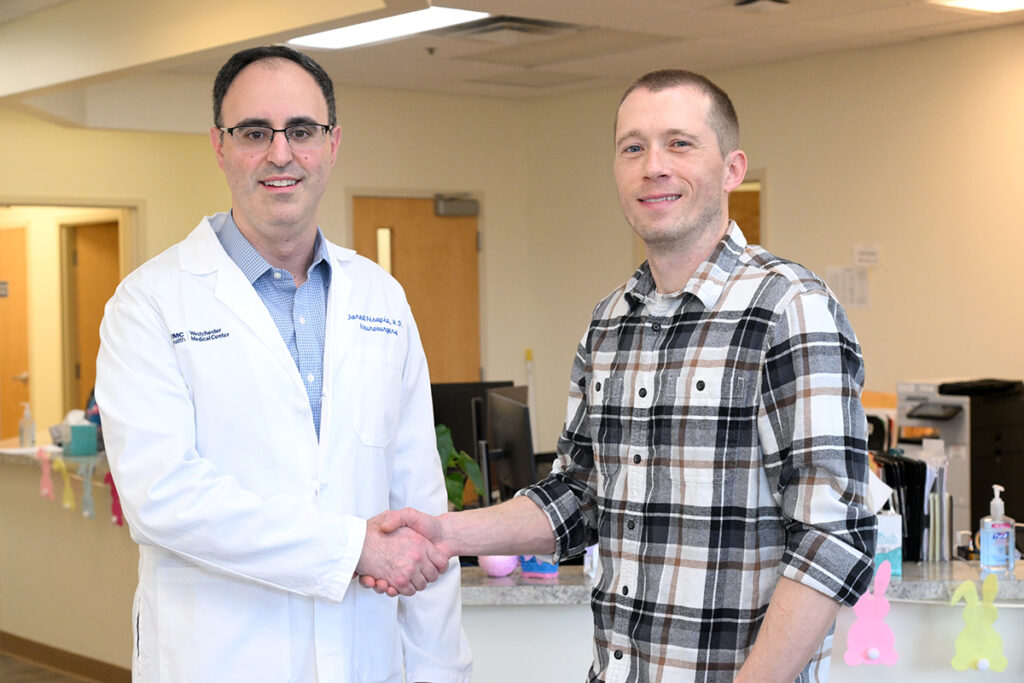Andrew McGrath was on his way to work early one morning when a car switched lanes in front of him and clipped his motorcycle. McGrath slid into a nearby guardrail that hooked onto his jacket, which resulted in a hyperextended arm.
After being checked out at the emergency department, McGrath realized he couldn’t move his right arm. What he thought was a broken arm turned out to be an injury to the brachial plexus – a network of nerves that controls muscles and sensation in the arm.
“I wasn’t able to move my arm for about a month after the accident,” he said. “I went to an orthopedic doctor and got four separate CT scans before they found the damaged nerve.” After that, he had three nerve studies done that showed his function was not improving over time—and the muscles in his arm were beginning to atrophy, especially the biceps muscle. He was found to have peripheral neuropathy with injury to the nerve supplying the biceps called the musculocutaneous nerve.
McGrath began searching for a surgeon to help him regain function, which wasn’t an easy feat. Working at a semiconductor manufacturer doing electrical work, his biggest concern was keeping his dexterity.
“Most surgeons gave me options that were very invasive because of the location of the nerve,” said McGrath. “And many said the surgery was outside their expertise and turned me down.”
It took McGrath over four months to find Jared Pisapia, MD, a neurosurgeon at WMCHealth. After reviewing the case with other surgeons, Dr. Pisapia agreed to perform a nerve transfer surgery on McGrath’s arm.
Dr. Pisapia rerouted a small part of McGrath’s working nearby ulnar nerve and attached it to the biceps branch of the musculocutaneous nerve downstream of the injured nerve segment to restore biceps muscle function. Dr. Pisapia described the surgery as, ‘borrowing from the rich to feed the poor.’
“I was nervous about the surgery because if something went wrong, it could mean the loss of my dexterity,” said McGrath.
The surgery was successful, and McGrath went home that same day. He was diligent about his recovery, which required no movement in his arm for three weeks to preserve the healing of the delicate nerves tied together using fine suture under a microscope.
“I slept in a recliner to limit movement in my sleep and was extremely careful for even longer than three weeks. I could not afford to lose any more function,” he said.

Dr. Pisapia was pleased by the success of the surgery and the progress that McGrath made during his recovery. He regained the ability to flex his elbow, and his biceps muscle returned to the size it was before his accident.
Two years later, McGrath is doing everything he could before his accident. “I have about 85-90 percent of my strength back compared to my left arm,” he said. “I got my life back, and I have Dr. Pisapia to thank.”
Dealing with peripheral neuropathy can be challenging physically, emotionally, and mentally. Access to support and resources is crucial for recovery.
At WMCHealth, we provide comprehensive care for individuals with peripheral nerve damage, offering specialized treatments, expert medical professionals, and a range of support services. Our multidisciplinary team is dedicated to helping patients navigate their condition and improve their overall well-being.
Do not wait to regain your life and function. Schedule an appointment with our expert neurosurgeons at WMCHealth today and take the first step towards your recovery.
